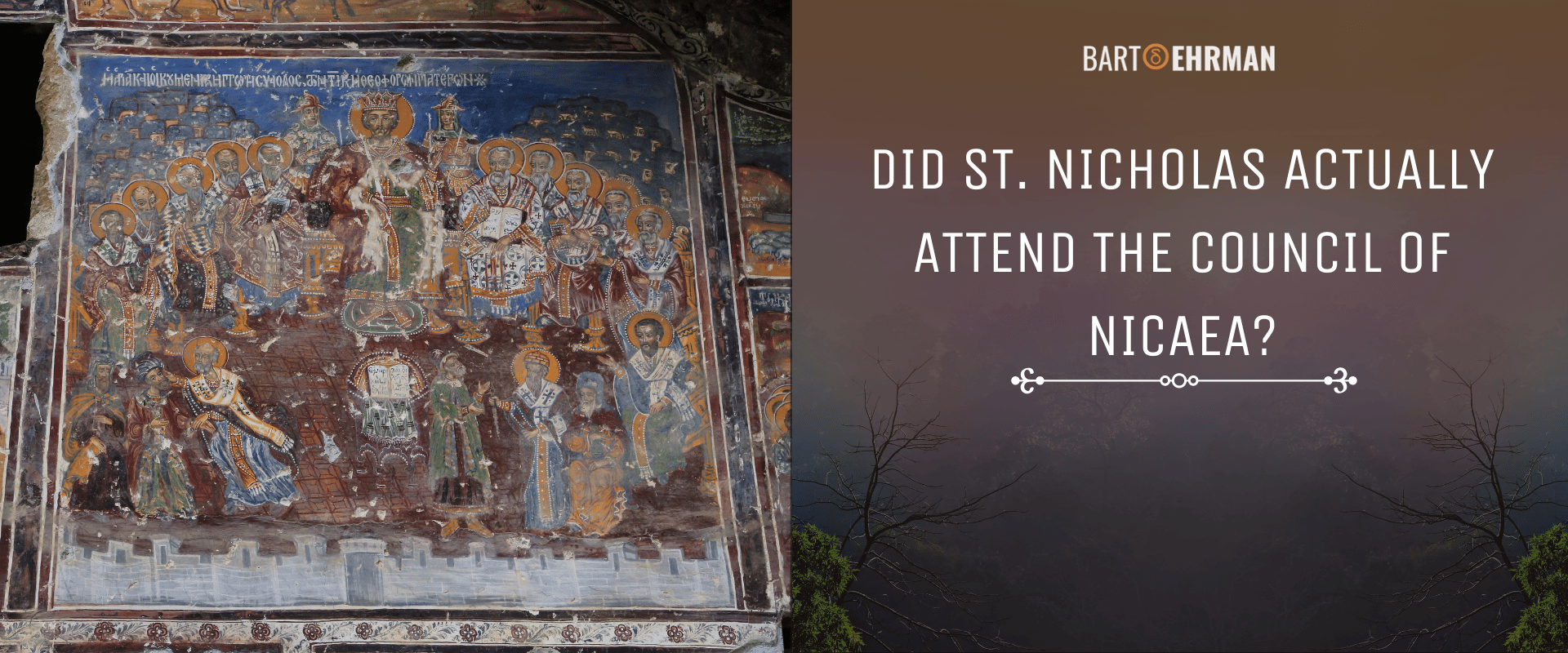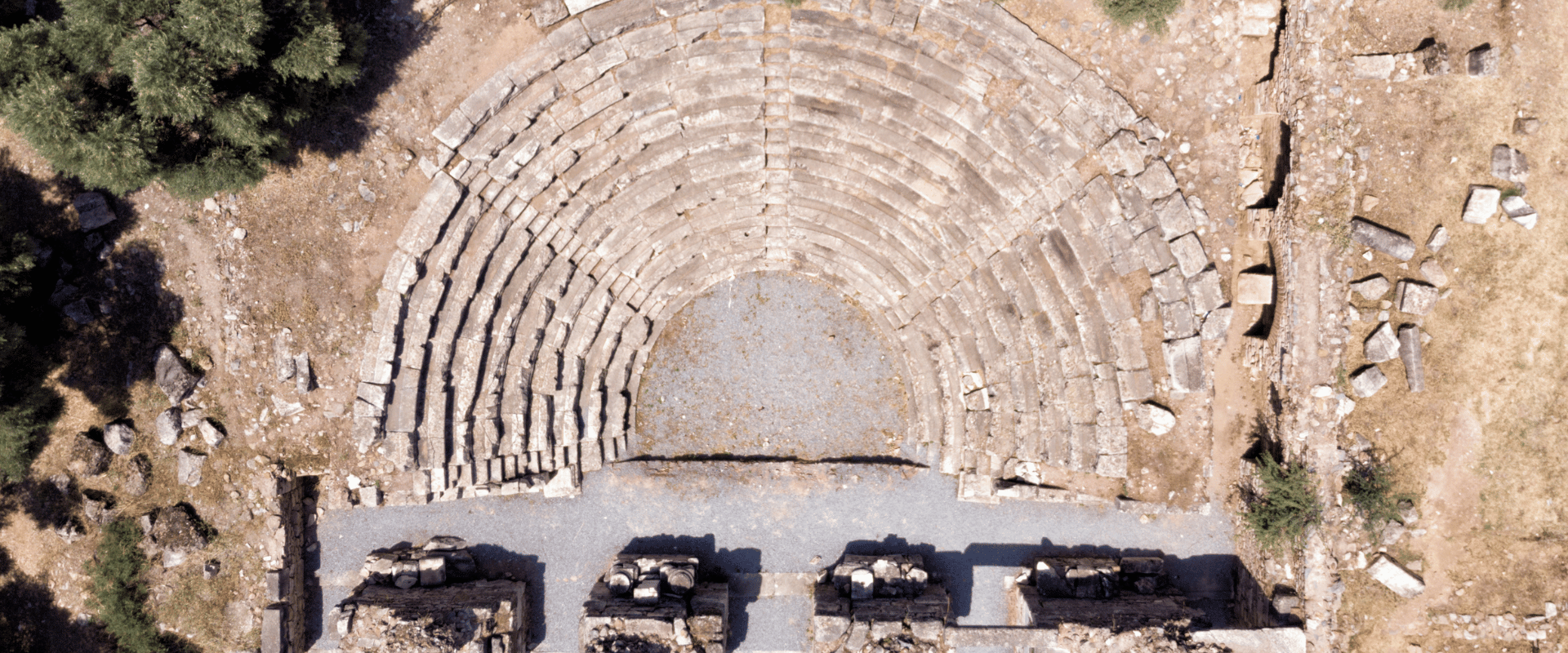Did St. Nicholas Actually Attend the Council of Nicaea?

Written by Joshua Schachterle, Ph.D
Author | Professor | Scholar
Author | Professor | BE Contributor
Verified! See our editorial guidelines
Verified! See our guidelines
Date written: December 12th, 2023
Disclaimer: The views and opinions expressed in this article belong to the author and do not necessarily match my own. - Dr. Bart D. Ehrman
Despite the fact that we have none of his own writings, there are good, historical reasons to believe in the existence of St. Nicholas of Myra. Saint Nicholas is most popularly known as the key inspiration for the modern-day figure of Santa Claus.
But there’s good reason to suspect that beyond the folklore and mystique, Saint Nicholas was not only a man of real faith and conviction, but that he also attended one of the most pivotal assemblies in Christian history. He may have even made an impact on the proceedings! In this article, I’d like to discuss the intriguing question of whether St. Nicholas attended the seminal Council of Nicaea.

First Things First: What Was the Council of Nicaea?
It all started with Constantine the Great (272-337), the first Christian emperor of Rome. While Constantine was not raised as a Christian, he converted to Christianity just before becoming the sole emperor in 324 CE.
The good news for Christians? With a Christian emperor, Christianity became legal and the persecutions instituted by Constantine’s predecessors ended. However, while Christianity was proliferating throughout the Roman Empire, there was a dizzying diversity of Christian beliefs and practices. In addition, there was no central Church structure so there was no way of definitively adjudicating theological arguments or even marking important Christian calendar events.
One of the more prominent unsettled theological arguments started in Alexandria, Egypt. A priest named Arius claimed that Jesus, since he had been created by God the Father, was subordinate to God rather than equal to him. While many agreed with this position, Alexander, the bishop of Alexandria, did not, claiming that Jesus was coeternal with God. He held smaller meetings of clergy in Alexandria to discuss the matter but nothing was ultimately resolved.
Constantine heard about this controversy and decided that this and other divisive issues needed to be resolved once and for all. Accordingly, he convened a synod or council of bishops in the city of Nicaea in modern-day Turkey in 325 CE. The bishops came from all over the Roman Empire, although due to the difficulty of travel in the ancient world, most came from the eastern regions nearer to Nicaea.
Different chroniclers of the council claim different numbers of bishops who attended. One source says there were 200, another says there were only 50, and another says there were 318. The truth, according to most scholars, is that there were likely 200-300 bishops in attendance, along with various other clergy and servants in their entourages.
While the Council itself is a fascinating topic, here I want to address whether St. Nicholas attended it or not. As always with ancient history, we can never know with 100% certainty. However, I think there are good historical reasons to believe that Nicholas attended the council.
Nicholas Was Invited by Constantine
As a bishop, Nicholas would certainly have been invited to the council by Emperor Constantine. According to Church Historian Eusebius of Caesarea, the invitation read as follows:
I announce to you, my beloved brothers, that all of you promptly assemble at the said city, that is at Nicaea. Let every one of you therefore, as I said before, keep the greater good in mind and be diligent, without delay in anything, to come speedily, that each may be physically present as a spectator of those things which will be done.
Beyond the power and authority wielded by any Roman emperor, Constantine was the first Christian emperor. Any council he convened was sure to make significant theological and administrative decisions, ones in which any bishop in the empire would surely want to participate as a discussant and voter.
The idea that Nicholas would turn down such an invitation doesn’t seem historically plausible. He would have accepted.
Nicholas Lived in the Region
Nicholas was the bishop of Myra, a port city on the Mediterranean Sea in what is now southern Turkey. It was just over 400 miles overland from Myra to Nicaea in the north of that region, then called Asia Minor. Could Nicholas have made this journey?
It would have been difficult for sure. As an honored bishop, he would have likely traveled in a horse or donkey-pulled cart laden with all the food and material goods necessary for the journey. A group of clergy and servants would have accompanied him, most of them traveling on foot. Walking to Nicaea would have taken at least two weeks and probably more.
However, in 325 CE, Nicholas would have been in his early 50s. This was not young in the ancient world. However, he would go on to live 25 more years, indicating that he must have been relatively healthy.
While this would have been an arduous journey, it was absolutely do-able.
Nicholas on (Some) Lists of Attendees
As I noted above, there are different lists of attendees at the council. These differ in number but also in the names they include or exclude. On all the longest lists, the name “Nicholas of Myra” appears. On the shorter lists it does not.
One of the lists on which he does appear, that of Theodore the Lector, is considered by scholars to be one of the more accurate. The fact that he is not included on some lists may simply mean that Nicholas wasn’t one of the more influential participants at the council.

The Council’s Agenda Focused on Eastern Concerns
In 286 CE, the emperor Diocletian, one of the worst persecutors of Christians, had divided the empire into two halves, ruling the Eastern half himself while another co-emperor, Maximian, ruled the West. By the time of Constantine’s reign, there was only one emperor, but the divisions between East and West remained.
I’ve already mentioned that most of the bishops who attended the Council of Nicaea were, like Nicholas, from the Eastern half of the Roman Empire. A quick look at the council’s agenda reveals that most of the issues discussed had their origins in the Eastern Empire as well, although the decisions of the council were certainly applied to the West as well.
The fact that these issues originated in Alexandria, one of the main cities of the Eastern Empire, would certainly have made them highly relevant to an Eastern bishop like Nicholas. This also explains why so few bishops from the Western church attended, although the fact that they had to travel much further than most Eastern bishops would also have contributed.
Incidentally, there is a story that Arius, the priest who claimed that Jesus was subordinate to God, made a big speech on this topic in front of the council. Nicholas, unable to restrain himself, walked up to him and slapped him in front of everyone.
While there is no way to be sure, this story probably never happened. Why? Only bishops were allowed to speak or vote in the proceedings of the Council of Nicaea. While Arius, who was only a priest, could have gone to the council as another bishop’s attendant, he would not have been allowed to speak to the council. Nevertheless, this story has persisted for centuries.
Conclusion: Did St. Nicholas Attend the Council of Nicaea?
As a historian of the ancient world, I often find it disappointing that the best we can often do is to make pronouncements with varying levels of probability. There is very little certainty to be had.
However, I think there are good reasons to say with a fairly high degree of probability that Nicholas attended the Council of Nicaea.
First, one doesn’t turn down an emperor. As a bishop, Nicholas would certainly have received an invitation to the council from Constantine. In addition, Constantine was not only the Roman Emperor but a Christian Roman emperor. This council offered Nicholas the opportunity to participate in decisions that would have far-reaching consequences for the future of Christianity.
Second, Nicholas lived in the general region of Nicaea. The Roman region of Asia Minor, which we now call Turkey, included both Nicaea and Nicholas’ city Myra. While it would have been a slow and strenuous journey of more than 400 miles, Nicholas would likely have undertaken it for the sake of this important occasion.
Third, the council focused largely on issues that originated in the Eastern empire, principally Alexandria, Egypt, a major Christian center. Nicholas would likely have heard about these issues already, even forming his own opinions about them, and would have been eager to participate and add his voice to the council’s decisions.
St. Nicholas probably did attend the Council of Nicaea.
